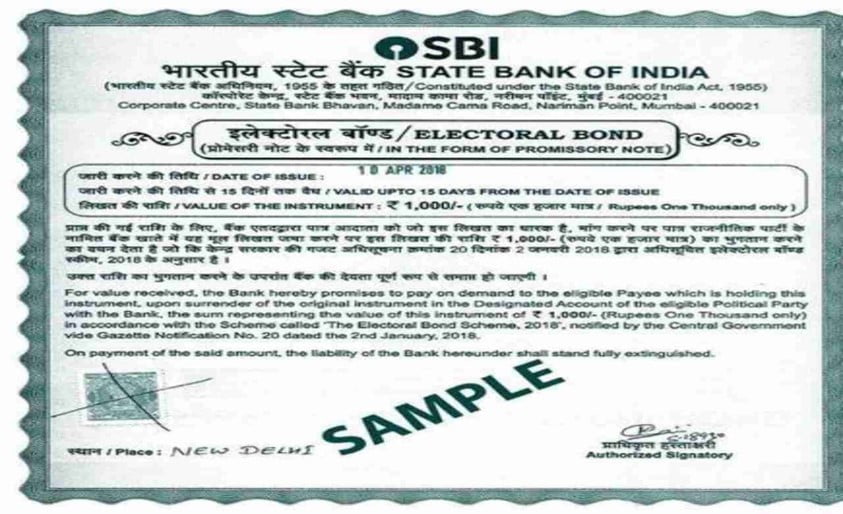Governance
Context: The government has shelled out Rs 9.53 crore of taxpayers’ money towards commission and printing costs of the Electoral Bonds (EBs) issued to fund political parties.
About Electoral Bond Scheme:

- Introduced with the Finance Bill, 2017, the Electoral Bond Scheme was notified on January 29, 2018.
- An Electoral Bond is like a promissory note that may be purchased by a person who is a citizen of India or incorporated or established in India.
- A person being an individual can buy Electoral Bonds, either singly or jointly with other individuals.
- The bonds are like banknotes that are payable to the bearer on demand and are interest-free.
- Only the Political Parties registered under Section 29A of the Representation of the People Act (RPA), 1951 and which secured not less than one percent of the votes polled in the last General Election to the House of the People or the Legislative Assembly of the State, shall be eligible to receive the Electoral Bonds.
Procedure:
- The State Bank of India (SBI) has been authorised to issue and encash Electoral Bonds through its 29 Authorized Branches.
- The bonds are sold by the SBI in denominations of Rs 1,000, Rs 10,000, Rs 1 lakh, Rs 10 lakh and Rs 1 crore.
- One can purchase these bonds only digitally or through cheques.
- The Electoral Bonds can be encashed by an eligible Political Party only through a Bank account with the Authorized Bank.
- The Electoral Bond deposited by an eligible Political Party in its account is credited on the same day.
- Electoral Bonds shall be valid for fifteen calendar days from the date of issue and no payment is being made to any payee Political Party if the Electoral Bond is deposited after expiry of the validity period.
Advantages of Electoral Bonds:
- Ensures Accountability: Donations through Electoral Bonds will only be credited in the party bank account disclosed with the ECI.
- As encashment of all the donations are through banking channels, every political party shall be obliged to explain how the entire sum of money received has been expended.
- Discouraging Cash: The Purchase will be possible only through a limited number of notified banks and that too through cheque and digital payments. Cash will not be encouraged.
- More Transparency: It helps the political parties to operate in a more transparent manner with the election commission, regulatory authorities and the general public at large.
- Maintains Anonymity: The individuals, groups of individuals, NGOs, religious and other trusts are permitted to donate via electoral bonds without disclosing their details. Therefore, the identity of the donor is being preserved.
Criticism of Electoral Bonds:
- Hindering Right to Know: Voters will not know which individual, company, or organisation has funded which party, and to what extent. Before the introduction of electoral bonds, political parties had to disclose details of all its donors, who have donated more than Rs 20,000.
- The change infringes the citizen’s ‘Right to Know’ and makes the political class even more unaccountable.
- Unauthorized Donations: In a situation where the contribution received through electoral bonds are not reported, it cannot be ascertained whether the political party has taken any donation in violation of provision under Section 29B of the RPA, 1951 which prohibits the political parties from taking donations from government companies and foreign sources.
- Leading to Crony-Capitalism: It could become a convenient channel for businesses to round-trip their cash parked in tax havens to political parties for a favour or advantage granted in return for something. Anonymous funding might lead to infusion of black money.
- Loopholes: Corporate Entities may not enjoy the benefit of transparency as they might have to disclose the amount donated to the Registrar of Companies; Electoral bonds eliminate the 7.5% cap on company donations which means even loss making companies can make unlimited donations etc.
Supreme Court’s Stance on Electoral Bonds:
- The Supreme Court (SC) agreed that the scheme protects the identity of purchasers of electoral bonds in a cloak of anonymity, but highlighted that such purchases happened only through regular banking channels.
- In 2019, the Supreme Court asked all the political parties to submit details of donations received through electoral bonds to the ECI. It also asked the Finance Ministry to reduce the window of purchasing electoral bonds from 10 days to five days.
- The Election Commission of India (ECI) also told the Supreme Court of India that while it was not against the Electoral Bonds Scheme, it did not approve of anonymous donations made to political parties.
Way Forward:
It can be said that the release of electoral bonds will restrict the generation of black money up to some extent. But the rule that identity of the donors will be kept confidential may make futile the exercise to eliminate black money, as it may just end up making Black money White.
The government may reconsider and modify certain provisions of the Electoral Bonds Scheme to ensure full disclosure and transparency. At the same time, the bonds should ensure that the funds being collected by the political parties are accounted for clean money from the appropriate channels without any obligation of give and take.
Source: Indian Express














